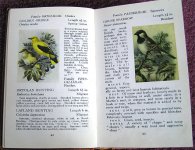Edward
Umimmak

A female Golden Oriole flew into a house in the village of Reyðarfjörður in eastern Iceland yesterday. It flew into a window, was stunned, photographed and released unharmed. There are nine previous records of Golden Oriole in Iceland.
It's one of my most wanted birds in Europe (didn't see any in Spain in mid-April) and if it's still there at the weekend I'll just have to go for it - even though it's a 600 km drive - ONE WAY. Scenery on route is fantastic though and there's always a good chance of finding something else. We'll see.
Photo of the critter here:
http://www.galdur.is/fuglar/tmp1.php?pid=67
E
It's one of my most wanted birds in Europe (didn't see any in Spain in mid-April) and if it's still there at the weekend I'll just have to go for it - even though it's a 600 km drive - ONE WAY. Scenery on route is fantastic though and there's always a good chance of finding something else. We'll see.
Photo of the critter here:
http://www.galdur.is/fuglar/tmp1.php?pid=67
E





